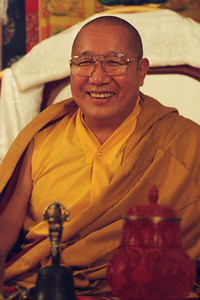From The Spiritual Path: A Compilation of Teachings by Jetsunma Ahkon Lhamo
The Buddha taught us to treasure those we do not know—even our worst enemies—as much as our most beloved relatives and friends. We should value them equally. “Is that really possible?” you may wonder. Not only is it possible; it is necessary. Boundless equanimity is the basis of compassion and of a truly deepened, stable practice.
If you carefully examine why you value a loved one more than someone you have never met, or more than your enemy, you will uncover a whole mother lode of information and awareness required to understand the Buddha’s teaching. You will realize the extent to which you are motivated by desire. This can make you uncomfortable: sincere self-examination requires tremendous courage. I believe that the Buddha’s teaching is best understood and practiced if you are fearless in examining your motivation. This alone can be a great guru. You can learn much about your desire for approval, for recognition.
If you look closely at how you have felt about yourself throughout your life, you will see that you have played a kind of mirror game since birth. Children develop their sense of self by seeing its reflection in the eyes and minds of others. Through our perception of them, children learn about their appearance, qualities, and tendencies. This process continues even now: you modify your self-image as you watch your reflection in others.
Your belief in the reality of self-nature seeks its own continuation. That, of course, is the bottom line of survival instinct. Once we have developed the view that self-nature is inherently real, we see “other” as inherently real—all phenomena as inherently real. This perception seems essential to prevent chaos, to maintain stability.
But the Buddha teaches that we are empty of self nature. Our true reality is the primordial-wisdom state. The experience of self and other is merely a series of conceptualizations. Watch your mind as you meet a person for the first time. The determinations you make in order to distinguish that person from yourself or someone else are all tainted by attraction and repulsion. This is true even of the thought processes that occur when you are not looking at anything, when your eyes are closed, and when you are resting or in a relaxed state.
With attraction and repulsion, there is always wanting or not wanting; there is always grasping or pushing away. When attraction arises in the mindstream, repulsion will also occur to the same degree. Though you may not be aware of the repulsion at that moment, the seed is there which will cause it to be experienced at some future time. Once a cause-and-effect relationship is begun, it always fulfills itself—unless it is purified. That is why equanimity is essential to your meditation or practice. In order to attain equanimity, one must realize the emptiness or sameness or suchness which is the underlying reality of all perceived phenomena. The way to stabilize the mind is not through suppression. The goal is not to train your EKG to become a straight line. Realization is not a “flat-line” mentality. You are not supposed to act out your idea of peacefulness. You know how it’s done: not too blissful, just un-focus the eyes a little, a pseudo-Mona Lisa routine. We tend to think that the way to attain stability is to adopt a pose or posture, like a child putting on his daddy’s clothes.
The Buddha teaches that the primordial-wisdom state is the ground from which phenomena spontaneously arise. We experience them either purely, as spontaneous, natural movements of that Nature, or impurely, as delusions of self and other. The primordial wisdom state is clear; it has the quality of innate wakefulness; it is neither dead nor cold. Yet the moment you try to describe it, saying: “Well, it’s like this” or “It looks like this” or “It’s light” or “It’s love” or even “It’s innate wakefulness,” whatever words you use, the moment you describe it, you lose it. You lose it because you wrap concepts and terminology around it, making it a contrived, unnatural experience. But by gradually eliminating desire from the mindstream, you begin to practice equanimity. You begin to experience the natural state in meditation.
© Jetsunma Ahkön Lhamo











